Vamos, vamos chilenos Past Review
By Leah H (PSYCHOLOGY., Brandeis University) - abroad from 02/18/2015 to 07/12/2015 with
IFSA: Santiago - Chilean Universities Program, Santiago
I learned how to inhabit my discomfort, dismantle and reshape it. I learned that in its unwillingness to make exceptions the process of adjustment would demand growth in ways I couldn't have anticipated. I learned what it meant to take risks that were significant to me, and to live vividly. I learned how to care better, and out loud, and that an absence of language can serve to create space for a more powerful communication. I learned how to find beauty in a city that rewards those willing to look for it. I came to care for what Chile was and to see it for what it could be, as I do my own country. And I came to realize that however much of this place and these people I carried home with me, I would leave as much of myself behind to come back to. This has been a worth beyond words.
Review Photos
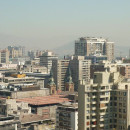
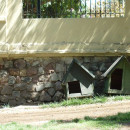
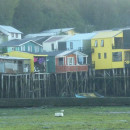
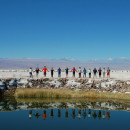
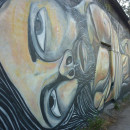
Personal Information
| How much international exposure did you have prior to this program? | 2 weeks - 1 month |
Review Your Program
|
* Overall educational experience
Academic rigor, intensity, resources, etc. |
My classes consisted mostly of elective credits, chosen based on their contribution to my Spanish minor or their cultural relevance to Chile and/or South America. All of my professors were invested in the engagement of their students and in the subject matter discussed, and conducted their classes in a format that combined lecture and discussion. An influential aspect of my academic experience, and one that merits mention for its continued relevance, is that I took classes only in la Catolica (PUC) and Diego Portales (UDP). Over the course of the semester these universities were far less affected by student protests, strikes, and sit-ins than the University of Chile, allowing my class schedule to remain relatively consistent as compared to that of friends of mine from the program whose academic loads were concentrated in the latter, many of whom found it a politically eye-opening experience but a frustrating one from the standpoint of an visiting student. |
|
* Host Country Program Administration
On-site administration of your program |
I truly felt that I could go to our Santiago program office for anything- academic, personal or cultural questions, a lunch tupperware in need of microwaving, or to chat over a cup of tea. Isa and Soledad are so invested in getting to know each student as an individual in the context of their own experiences, and ensuring that even those needs they might not be aware of having were met. They challenged the worldviews we arrived with and provided a safe space to express our wonder and doubt in equal measure, filling it with their ready humor and ensuring we neither entered nor left without a requisite kiss on the cheek. |
|
* Housing:
How satisfied were you with your living arrangements? |
My host family was without question the single most important factor in my transition into living in Chile; one of the only things that made leaving easier was knowing in my core that I would always have a home to return to. I learned so, so much in the five months that I lived with them; about the language, yes, but also about cultural perspectives, similarities and differences, how to laugh at my mistakes, the value of relationships and, in a heavier sense, of enduring loss and rebuilding. I was taught the sanctity of asados and fútbol, adopted more Chilean slang than I can account for, went out dancing with my sister and her friends, and waged a losing battle against my host mother's generous portions. Most importantly it showed me that Chile was never mine to be lived in and discarded; these were people’s lives I was entering into, complex and fully-formed, and everything I would live through alongside them would be equally real to me, and would not cease to exist when I departed. And although I would never have disagreed with this statement prior to arriving, it wouldn't have struck me with the same weight had my living arrangements not been what they were. |
| * Food: |
Being that I am a vegetarian and had been warned of Chile's limited offerings, I was thrilled to find out that my host sister was also a vegetarian and that I would never want for fresh, healthy meals in my host family's kitchen. Although I realize my fortune in this was specific to my circumstances, I feel that Santiago's vegetarian offerings have grown significantly in a short period of time to suit the evolving tastes of its population, and on top of the plentiful produce markets there were a great number of "hippies" and smaller establishments selling vegan burgers, fajitas, tacos, etc. for reasonable prices. I can't claim experience navigating stricter allergy and/or religiously-affiliated restrictions in Santiago, but if you are flexible and resourceful enough at the very least a vegetarian diet should not feel restrictive. |
|
* Social & Cultural Integration:
How integrated did you feel with the local culture? |
My host sister was a huge factor in my integration into the more social aspects of local culture; it was through her that I met the guy I would end up dating over the course of the semester, and in accompanying the two of them to house parties and celebrations I was able to experience a side of social life that I would not have known otherwise. In all honesty initiating friendships with Chileans can be a little daunting, as much for general factors such as language and the duration of your stay as for culturally specific ones, such as the vagueness of social invites and the fact that many Chileans seem to have maintained a stable circle of friends since primary school. With that said, I became friendly with many of my classmates simply by working on presentations or sharing metro rides home, and it didn't matter if a carrete was hosted by my sister or the cousin of a friend's friend; if you entered friendly, open-minded and with a good sense of fun people would receive you in the same way. |
|
* Health Care:
How well were health issues addressed during the program? |
I never had a health care issue serious enough to warrant medical attention, but I felt confident in the willingness and ability of my host family and the program administration to care for me in the event of a mishap. I did need a couple of vaccines before starting the program, but I encountered everything I needed easily through the CDC's website and a local travel clinic. |
| * Safety: |
My host family lived in a residential part of Ñuñoa, which at the time did not have easy access to the metro system, and there were two or three blocks between our house and the nearest bus station. I walked home many times after dark without feeling unsafe, especially given the presence of families coming home from the grocery store or people out walking their dogs even as late as 11pm. With taxis being relatively cheap and readily available at all hours I would always opt to take one home after having been out late, as its easy to split the fare among friends.The most uncomfortable I felt was receiving whistles and catcalls, typically during the day and more often during the summer months. An ingrained element in certain pockets of machismo culture, they can be off-putting or amusing depending on personal perspective, but the intentions behind them are generally harmless and often seem to have more to do with winning their buddies' approval than female attention. Also locals will warn you a lot about petty theft/pickpocketing, especially on public transport; just be mindful of what you have on you and how you carry it. Common sense is your greatest ally here. |
| If you could do it all over again would you choose the same program? |
Yes
|
Finances
|
* Money: How easily were you able to live on a student's budget?
(1 = not very easy/$200+ on food & personal expenses/week, 2.5 = $100/week, 5 = very easily/minimal cost) |
Chile is known for being one of the more expensive Latin American countries; however, with all meals and laundry included in the cost of the homestay, a student's spending habits can easily be adjusted according his or her personal budget. For instance, in terms of traveling bus fare is generally cheaper than air fare, and for in-city entertainment there are fantastic free exhibits and events in most museums and cultural centers, and reduced student prices in many others. The money I had available to me while in Chile was money I had earned during the extended winter break prior to going abroad, and I was able to avoid any pitfalls towards the end of the semester by remaining aware of how much and how often I withdrew money and balancing the larger expenses (travel, going out to clubs) with cost-free activities. Ultimately the experience you have on any budget will be primarily determined by your mindset and the people you are with, not by the amount of money that you spend. Santiago has a lot more to offer than most people give it credit for, its just a matter of knowing where to look. |
| Not including program expenses, about how much money did you spend on food and other expenses each week? | ~$100 averaged out (taking into account public transportation costs, entertainment, and travel) |
Language
| * Did your program have a foreign language component? | Yes |
|
How much did the program encourage you to use the language?
0 = No encouragement, 5 = frequent encouragement to use the language |
|
| How would you rate your language skills at the beginning of the program? | Advanced |
| How would you rate your language skills at the end of the program? | Fluent |
| What was the highest level language course you had completed prior to departure? | HISP 106B |
| How many hours per day did you use the language? | 10+ |
| Do you have any tips/advice on the best ways to practice the language for future study abroad participants? | Dive in. I came to Chile capable of writing a ten page film paper in Spanish but tripping over the real-time demands of conveying in speech the humor and emotions that had so effortlessly defined my existence in English. And the mistakes were often confusing, funny, awkward, or all three, but there is no other way to learn and no more rewarding way to connect and understand a culture on a deeper level. Chile has a special, charismatic, sometimes frustrating breed of Spanish; it trips and tumbles, in turns quick, choppy, and drawn out. It will not be the Spanish you learned in high school or college. Allow yourself to get frustrated; progress is inevitable, and believe it or not it grows on you. Regardless, you will return irreversibly, intrinsically connected with the country and people simply by having been steeped in its language, and there's something beautiful to be found in that. |
Other Program Information
|
* Where did you live?
Select all that apply |
|
|
* Who did you live with?
Select all that apply |
|
|
* Who did you take classes with?
Select all that apply |
|
| About how many local friends did you make that you will likely keep in touch with? |
A Look Back
| * What did you like most about the program? |
|
| * What could be improved? |
|
| * What do you know now that you wish you knew before going on this program? | That mindset is a huge determinant of experience; allow yourself to live your own, but stay on top of it. Don't take yourself too seriously, and have patience. At some point five months will cease to feel like a very long time, so don't treat the opportunities you are granted as if they were expendable. On the other hand, it is not a waste of a long weekend not to travel; I got to know some of my favorite people and aspects of the city by sticking around. Decide for yourself what is you find meaningful, and cultivate it. |
Reasons For Studying Abroad
| To help future students find programs attended by like-minded individuals, please choose the profile that most closely represents you. |
The Nearly Native or Trail BlazerCraving the most authentic experience possible, perhaps you lived with a host family or really got in good with the locals. You may have felt confined by your program requirements and group excursions. Instead, you'd have preferred to plan your own trips, even skipping class to conduct your own 'field work.' |








